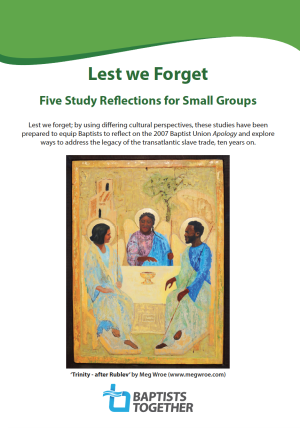The Apology, 10 years on
Baptists are being invited to reflect on our Union’s Apology for Slavery and its practical outworking as it nears its 10th anniversary
 A new series of study reflections have been created for small groups to provide further reflection and interpretation on The Apology itself and The Journey that has followed.
A new series of study reflections have been created for small groups to provide further reflection and interpretation on The Apology itself and The Journey that has followed.
In November 2007 Baptist Union Council made a resolution that acknowledged our share in and benefit from our nation’s participation in the transatlantic slave trade. Out of the resolution came a commitment to develop ways of promoting racial justice across our Union.
The strategic priorities subsequently recommended to Council – such as building multicultural congregations and developing the leadership skills of black and minority ethnic youth – became known as The Journey.
The new resource is called Lest We Forget, and offers reflections and Bible Study notes. In the resource foreword, General Secretary Lynn Green invites Baptists to use the resource and “challenge the practical outworking of The Apology across Baptists Together”.
‘There is no doubt in my mind that we need to keep being intentional about growing into the ‘all nations’ vision of God’s people that we see in the Scriptures,’ she wrote.
‘One of the ways we will achieve this is through listening deeply to the experiences and perspectives of others and allowing ourselves and our communities to be shaped by the Lord through these encounters.’
Its contributors are Doreen Morrison, an independent researcher, CEO of Liberty Trails Emancipation history tour company in Jamaica and author of Slavery’s Heroes: George Liele and the Ethiopian Baptists of Jamaica 1783 – 1865; Joe Kapolyo, lead minister at Edmonton Baptist Church, London; Steve Latham, pastor of King’s Cross Baptist Church in central London, and an associate tutor at Spurgeon’s College; Michele Mahon, a Baptist minister who served as youth pastor at Brockley Baptist Church in south-east London and is due to travel to Peru for long term mission with BMS; and Marvia Lawes, an ordained minister in the Jamaica Baptist Union.
‘Through considering The Apology from these different perspectives, I hope that you will be enabled to think more deeply about how issues of racial justice are relevant and can be applied in your own context,’ Mrs Green continued.
‘As we reflect on the ten years since The Apology, I pray that you will find fresh vision and determination to journey on towards our Kingdom future.’
One of the endorsements comes from Ken Livingstone, a minister in-training at Stockport Baptist Church and Northern Baptist College.
He writes, ‘Lest We Forget is an aptly named resource, for how many in our Baptist pews have any more than a fleeting memory of The Apology issued by the Baptist Union 10 years ago? Writing as someone who was not at that time part of a Baptist church, it isn’t even a memory.
'This is therefore a welcome resource for all our churches, helping to ensure that issues of race and discrimination are not allowed to creep back under the carpet, where they had resided for many years.
‘Perhaps the most notable feature of this resource is its uncompromising language and opinions, some of its contributors reflecting significant criticism of the original Apology…. for those of us who choose to engage with it, it is guaranteed to have us wrestling with some deep, weighty, complex issues.’
Lest We Forget is free, and can be downloaded here: http://www.baptist.org.uk/Articles/488872/Lest_we_Forget.aspx
Related:
The Journey continues Increasing the number of Black and minority ethnic (BME) ministers and leaders remains a challenge for Baptists
Baptist Times, 02/03/2017